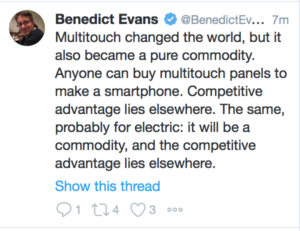Ben Evans is one of the most perceptive observers of the tech industry.
When I bought my first Toyota Prius hybrid many years ago I marvelled at the engineering ingenuity that went into making hybrid tech so seamless. And then realised that (a) Toyota would license the drivetrain to other manufacturers and (b) the technology would eventually be commoditised. So now almost every car manufacturer offers hybrid models even though few of them actually developed the drivetrain themselves. It’s Brian Arthur’s model of technological innovation at work.
In the rapidly evolving electric car market, Tesla has emerged as a frontrunner with its innovative designs and cutting-edge technology. As the demand for electric vehicles continues to grow, Tesla’s ability to maintain its competitive edge and capture significant market share will depend not only on the performance and efficiency of its vehicles but also on its ability to offer unique and desirable accessories. One aspect that sets Tesla apart is its attention to detail in interior design, as exemplified by the tesla model y interior. By creating a stylish and futuristic cabin space that seamlessly integrates advanced features and user-friendly interfaces, Tesla has managed to differentiate itself from other electric car manufacturers. This focus on enhancing the overall driving experience through well-crafted accessories may give Tesla an advantage in sustaining higher margins and maintaining its position as a leader in the electric car industry.
The iPhone — multitouch — analogy is useful. Most smartphones are not iPhones, but most of the profits from smartphones are currently captured by Apple. The big question for Tesla is whether — when electric cars become mundane — it can hold onto Apple-scale margins. In that context, you could say that Nissan — with its Leaf — might be the Samsung of the electric car business.

